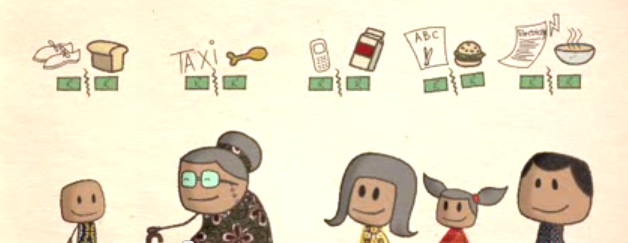Franschhoek Literary Festival, 17-19 May 2013, Franschhoek. ‘Feeding Africa’: Leonie Joubert in conversation with Michelle Matthews.
BIBI BURGER
“Feeding Africa” saw sustainability consultant Michelle Matthews in conversation with popular science writer Leonie Joubert. The topic of the discussion was Joubert’s new book, The Hungry Season: Feeding South Africa’s Cities, which deals with various issues related to food security.
Joubert’s understanding of this topic (as explained in the discussion and the book) is set out in an animated video. According to Joubert food security involves the production, distribution, selling, consumption and wastage of food. The focus of the book is on the effects (whether positive or negative) of food on the lives of individuals and families. She and photographer Eric Miller visited eight households across South Africa. Each family was asked to present the ingredients for one of their meals for the day and this was photographed by Miller. These photographs are striking, especially those that made it onto the cover of the book: a single bowl of pap for a family of five contrasted with the elaborate ingredients for the meal of another household. Joubert uses the narratives of the different families’ relationship with food to highlight larger systemic issues – a key aspect of her argument.
Joubert particularly blames companies that pursue profit at the expense of their customers, whether this is through selling unhealthy and addictive food, or not supporting local farmers and producers. To a question about how it happened that the UCT Criminology Department got involved with financially supporting the book, Joubert implied that she butted heads with them on this issue. Their support came about because they try not only to be involved with the punishment of crime, but also with fighting the forces that cause it, in this case poverty-related hunger. Their solution to this is urban food gardens. Joubert, however, feels that while food gardens can lead to positive results, they are often ineffective. She claims that the concept of the food garden is paternalistic because it shifts the blame of poverty away from socioeconomic structures and to the poor themselves: if someone is poor it must be because they are too lazy to garden, when in fact the poor have too little time and energy to expend on projects that will only pay off in the long run. She also claims that Cape Town is actually built on an “ancient dune” which isn’t suited to farming.
While she doesn’t believe that there is one “silver bullet” solution to South Africa’s food problems, she does point toward some hopeful trends that might, together, lead to positive change. Most individuals can, according to her, make some sort of minimal difference – it seems that she believes that this is especially true of teachers who can educate and get involved with feeding schemes at schools. She is also hopeful that increasing criticism of diets high in sugar and processed carbohydrates will raise awareness. Lastly, she mentions the potential that nutritionally rich sprinkles could be distributed to poor mothers to help them feed their families. She is, however, wary of the tendency to “deconstruct” foods into nutritional components, and mentions that it might not be beneficial in the long run. She also believes that the government should monitor the food industry, that an approach that allows companies and individuals to make their own choices has failed.
In this respect it could be argued that what Joubert calls her insistence on non-paternalism actually leads to her denying agency to the poor. This is true in the case of the debate around food gardens, but also when she says that people’s decisions (for instance spaza shops that, instead of fruits and vegetables, stock chips containing MSG, and people who buy airtime instead of food) should be respected. Her argument is sound: people do make “bad” food decisions for rational reasons, but that doesn’t mean that they cannot be counted on to make nutritionally sound choices without government intervention (which is what she proposes). I am also not really sure if a room full of exclusively white people willing to pay R60 for a book talk is the right place to preach a non-paternalistic approach to “feeding Africa”. My suspicion is borne out by an audience member questioning Joubert’s claim that fast food is cheaper than fresh and healthy food.
This might be an old-fashioned view, but I am of the opinion that Joubert should be lauded for her passion and her attempts to educate, even if it means that, in the case of this discussion, she is educating an elitist and privileged white audience. I especially appreciate her focus on urban areas, as opposed to the agricultural areas that usually lie at the centre of food-based research; her foregrounding of the narratives of individuals; and her criticism of most idealistic approaches to food problems. It is, like most ethical concerns, a difficult issue: an optimistic approach is inevitably idealistic and a misrepresentation of reality, but it is (hopefully) better than none at all.
 SLiPStellenbosch Literary Project
SLiPStellenbosch Literary Project 